Last Updated on March 7, 2024
Not too long ago, artificial intelligence (AI) was widely regarded as a silly concept that only existed in the wildest imaginations of some scientists. Not anymore. AI has now become part and parcel of our everyday lives. Even those who still harbor reservations about this disruptive technology cannot help but interact with it in their daily endeavors.
Artificial intelligence, along with machine learning, is actually considered one of the fastest-growing fields in technology. It’s also one of the most in-demand careers. Some of the industries that rely heavily on AI include digital marketing, transport & logistics, home automation, content creation, manufacturing, and retail.
The fact that artificial intelligence impacts many aspects of our lives explains the growing interest in learning more about this technology. Fortunately, there are multiple ways to familiarize yourself with basic AI concepts. One such method is by adding AI books to your reading list.
But with dozens of AI books at your disposal, choosing the most suitable one may not be a walk in the park. And that’s where we come in. We’ve trawled physical and online libraries to uncover some of the most beginner-friendly AI-themed books ever published.
These books are especially suitable for curious readers with no prior knowledge about artificial intelligence. However, they can also suit AI experts who wish to refresh their knowledge or uncover some previously-unknown facts about this evolving technology. Read on and be inspired!
1. Artificial Intelligence: A Modern Approach
by Stuart Russel and Peter Norvig
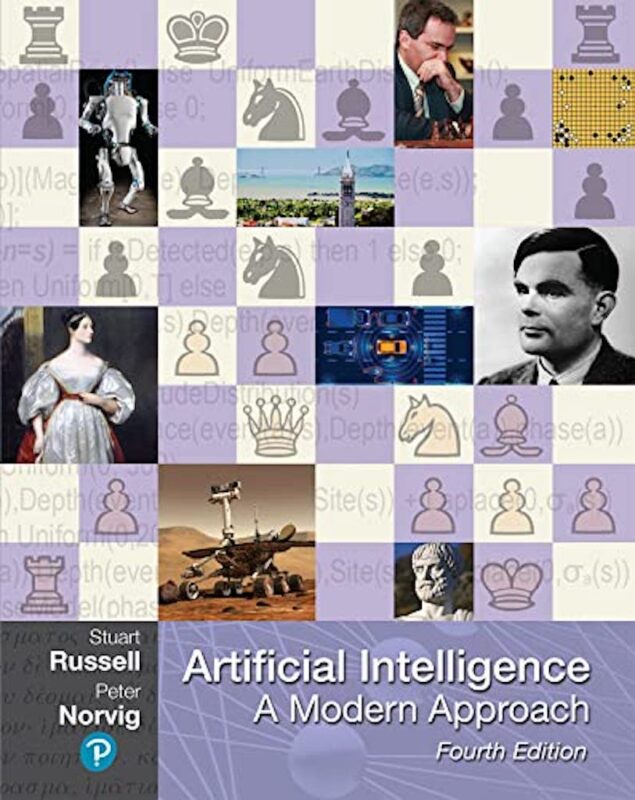
Artificial Intelligence: A Modern Approach by Stuart Russel and Peter Norvig describes artificial intelligence in the simplest language that anyone can understand. That’s one of the reasons many people consider it a top AI book for beginners.
The book also provides an easy-to-follow overview of the primary AI-related topics. It uses a rather straightforward style that makes the concepts and explanations therein even easier to grasp.
Although this book doesn’t delve too deep into AI, it provides enough information to kick-start an exciting career in this innovative field. Some of the areas tackled include search algorithms, statistical Natural Language Processing (NLP), game theory, local search planning approaches, and multi-agent systems.
There’s a subtle mention of advanced AI subjects too. However, this is only to pique your interest as the book doesn’t delve into the details.
2. Artificial Intelligence for Humans, Volume 1: Fundamental Algorithms
by Jeff Heaton
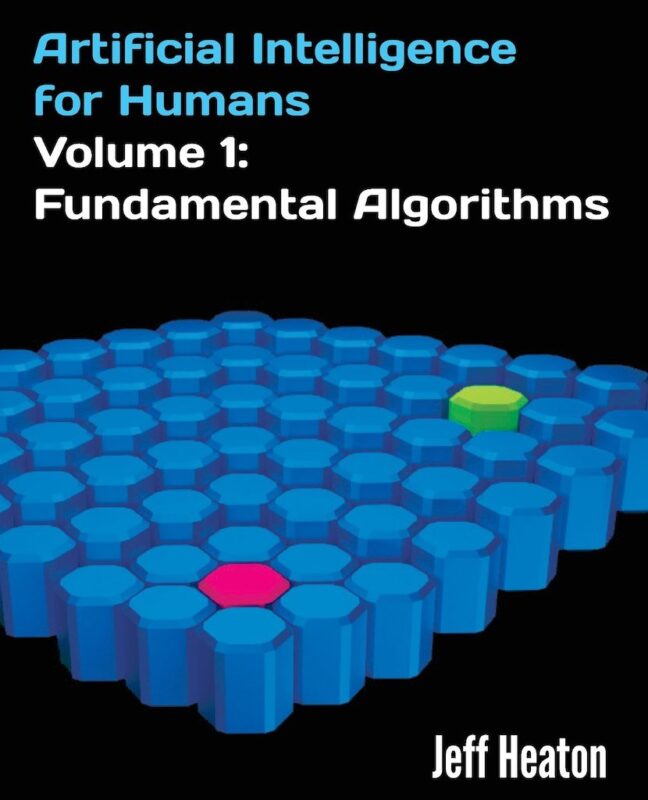
Artificial intelligence is wrongly misconstrued as the technology that will eventually replace the need for human knowledge. However, Jeff Heaton, through his book “Artificial Intelligence for Humans, Volume 1: Fundamental Algorithms,” reminds us of the inseparable relationship between man and machine.
The book offers its readers an overview and comprehension of various AI algorithms. It’s an excellent read for AI enthusiasts who do not have a significant mathematical background. You only need basic computer programming and some college mathematics skills to grasp the concepts therein.
Among the topics that Jeff Heaton’s Artificial Intelligence for Humans explores include linear regression, dimensionality, clustering, and distance metrics.
Each concept is discussed extensively using practical illustrations and use cases to help drive the point home. Besides, there are numeric computations that readers can easily execute on their own.
3. Artificial Intelligence For Dummies (2nd Edition)
by Luca Massaron and John Paul Mueller
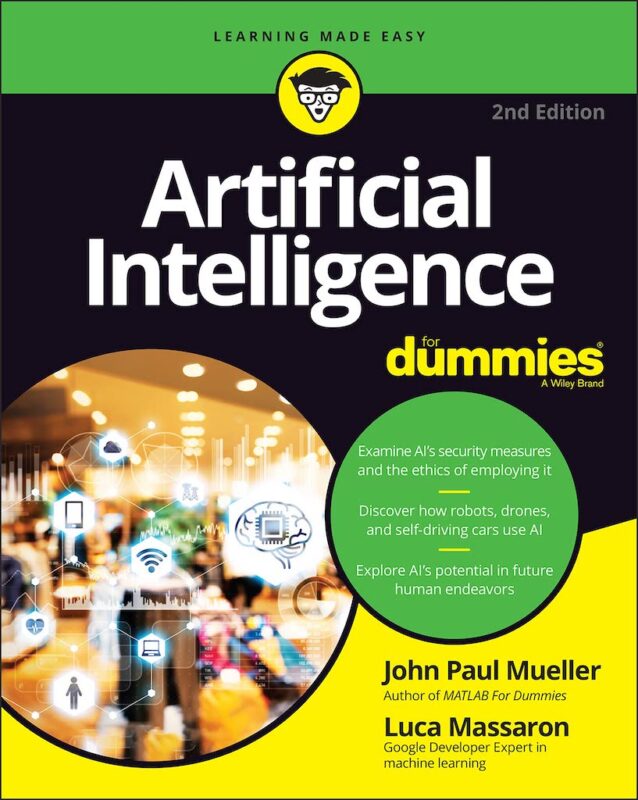
The name of this book says a lot about the intended readership. Authored by some of the most prolific technology writers, “Artificial Intelligence For Dummies” unpacks the fundamental AI concepts that everyone should understand before exploring the subject’s more intricate areas.
Artificial Intelligence For Dummies also addresses certain pertinent questions about the topic that you’ll not find in many AI publications. For instance, the book shares some insights into the processes involved in AI development while also assessing the technology’s authenticity.
This is also one of the few artificial intelligence publications that start at the very beginning as far as the technology is concerned. The book begins by offering the simplest definition to AI. From there, it explains relevant terms like data use, special hardware, and algorithms.
The book then highlights some of AI’s notable use cases. These include data management, robotics, drones, automobiles, medicine, and space.
4. Artificial Intelligence Basics: A Non-Technical Introduction
by Tom Taulli
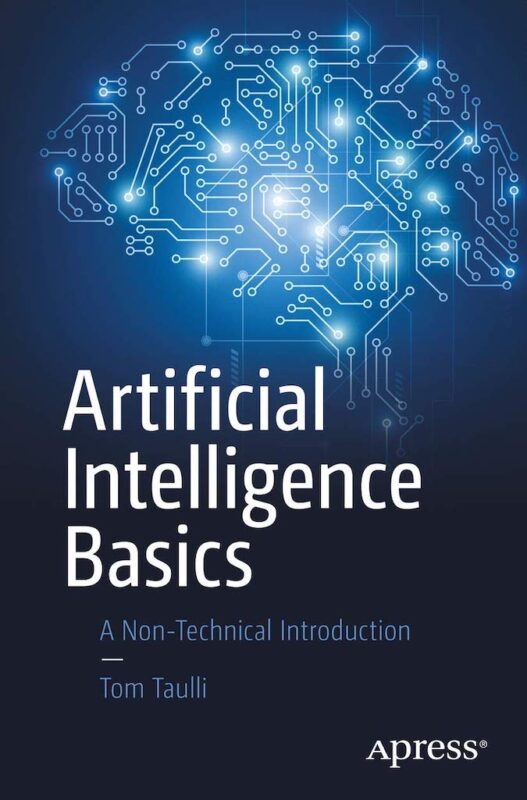
Here’s another AI book whose name leaves little doubt about whom the content is intended for. Tom Taulli’s “Artificial Intelligence Basics: A Non-Technical Introduction” provides a basic, non-technical analysis of AI and its far-reaching impacts.
The author begins with an engaging introduction to artificial intelligence and its related concepts like machine learning, natural language processing, deep learning, and robotics. It then discusses how AI was created and the strides made so far in terms of perfecting the technology.
After adequately familiarizing yourself with the basic AI concepts, you’ll understand the various pertinent issues surrounding the place of this technology in modern society.
For instance, the book explains the ethical dilemma surrounding AI and how the technology impacts societal trends. It also discusses AI’s future impacts on governance, corporate structures, and our daily experiences.
5. Artificial Intelligence: The Basics
by Kevin Warwick
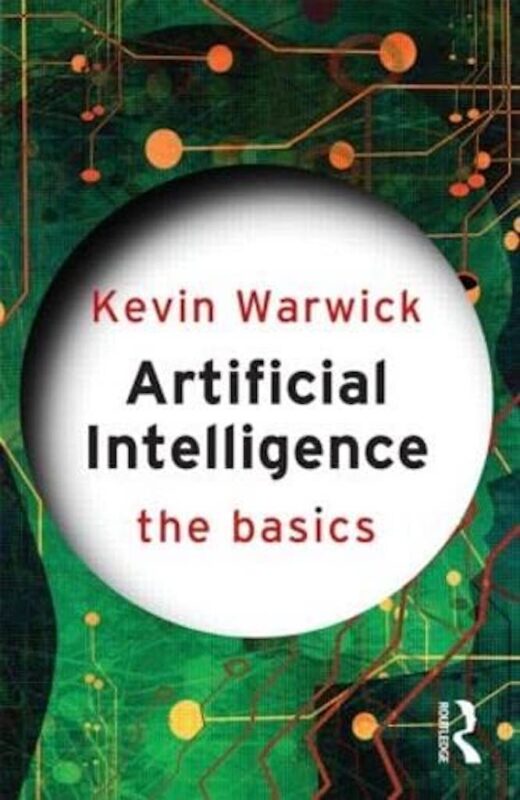
The near-similarity in name between this book and Tom Taulli’s AI-themed book discussed above implies that both publications address similar areas of artificial intelligence.
Artificial Intelligence: The Basics by Kevin Warwick provides the most concise and straightforward definitions to AI. The author is actually a pioneer in the intricate world of artificial intelligence. So, this book is a seamless blend of his learned knowledge and real-life experiences using AI technology.
You’ll start by learning about the history of artificial intelligence. The book will then introduce you to where AI is presently at before painting a picture of how the industry might evolve in the future.
There are plenty of other exciting topics to learn. Examples include the definition of intelligence with respect to both human and machine, the nature of consciousness, whether machines can actually think, and the controversial culturing of human neurons.
6. Make Your Own Neural Work
by Tariq Rashid
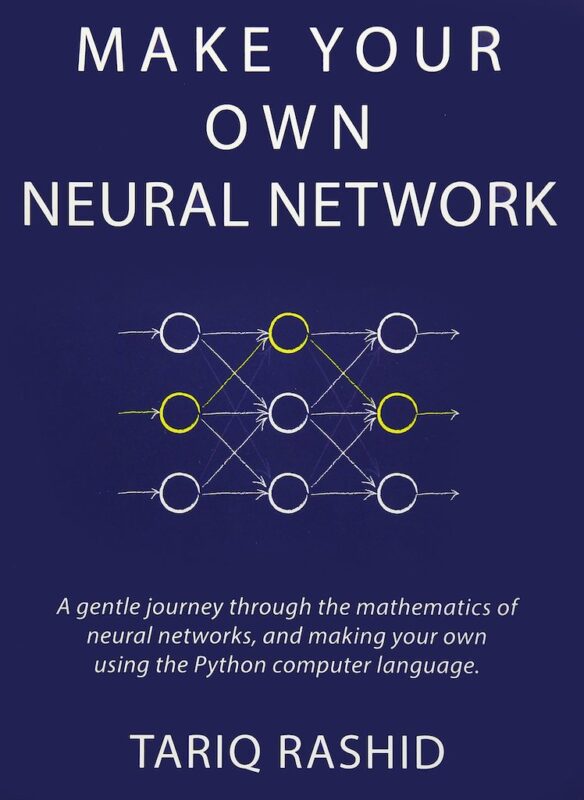
Make Your Own Neural Work adopts a step-by-step approach to understanding neural network mathematics and how you can create your own neural networks using the Python programming language. The book starts from the very foundation of neural network mathematics and then advances progressively into the technology’s most intricate concepts.
Make Your Own Neural Work is split into three major sections.
The first section deals with the many mathematical concepts which underpin neural networks, using clear illustrations and examples to make each concept easy to grasp.
The second section takes a more hands-on approach to learning neural network mathematics. It’s here that you’ll learn how to use Python to build your own neural networks.
The last section expounds further on the ideas learned in Parts 1 and 2. There are also quick guidelines on how to run the instructions on a Raspberry Pi.
7. The Singularity Is Near
by Ray Kurzweil
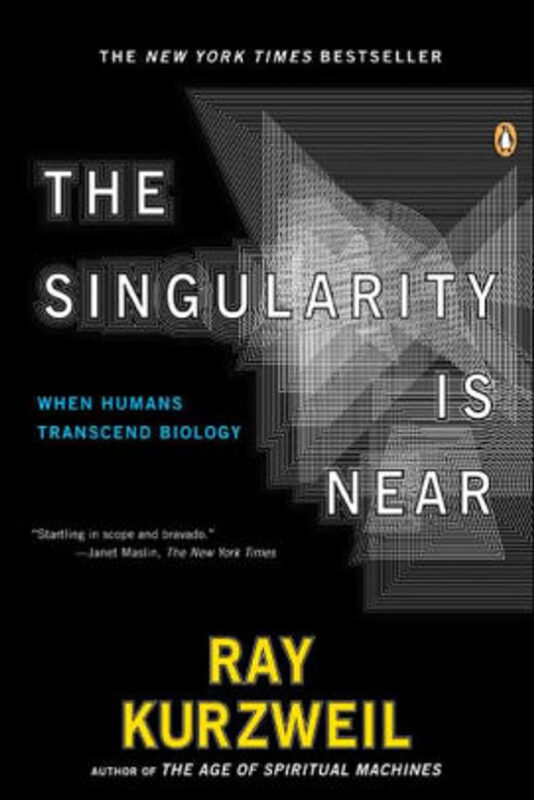
The Singularity Is Near is an artificial intelligence book by an author who has received numerous accolades from the likes of Bill Gates and the Wall Street Journal. The book brings into focus a key AI aspect that most people fear to venture into – Singularity.
Ray Kurzweil offers the most insightful view of AI’s revolutionary effects and how the technology might alter the course of humanity. He dwells particularly on the interdependence between humans and machines.
In the book, you’ll learn how artificial intelligence might expand the scope of human intelligence, material progress, and lifespan. And while the events are more futuristically described, it’s a matter of when (not if) they’ll begin to unfold.
Be warned that this isn’t a great read for conspiracy theorists. Rather, it’s a top recommendation for anyone who seeks to understand the fine line between human and machine, and how blurring that line may have far-reaching effects.
8. Basics of Artificial Intelligence & Machine Learning
by Dheeraj Mehrotra
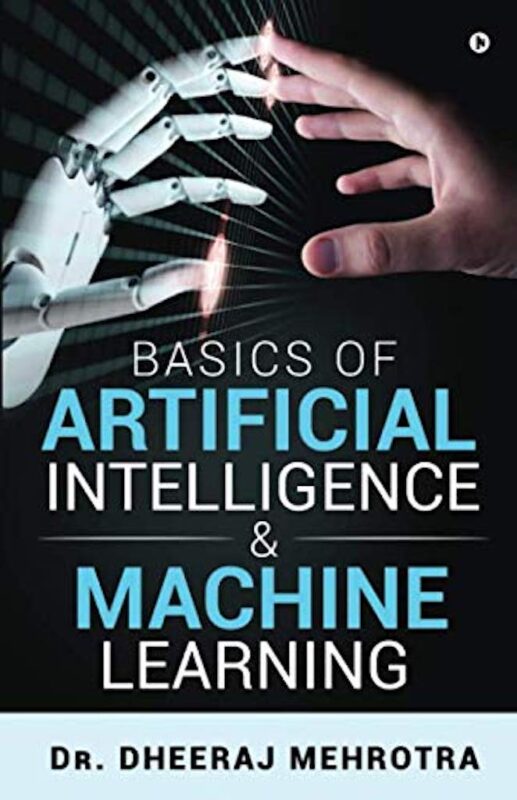
Many people confuse artificial intelligence with machine learning. But while both ideas are quite innovative, they’re not exactly the same. AI is a field concerned with how machines can mimic human intelligence while machine learning focuses on teaching a machine how to perform specific tasks accurately and automatically.
Dr. Dheeraj Mehrotra’s “Basics of Artificial Intelligence & Machine Learning” provides a comprehensive difference between AI and machine learning in a language and style that anyone can understand.
Not only does the book define AI and machine learning independently. It goes further to explain how each concept has evolved over time and their impacts on our daily engagements.
The author discretely compares the merits and demerits of AI without pronouncing his position on the matter. It’s upon the reader to weigh the arguments and determine the extent to which they should incorporate AI into their lifestyles.
9. Life 3.0: Being Human in the Age of Artificial Intelligence
by Max Tegmark
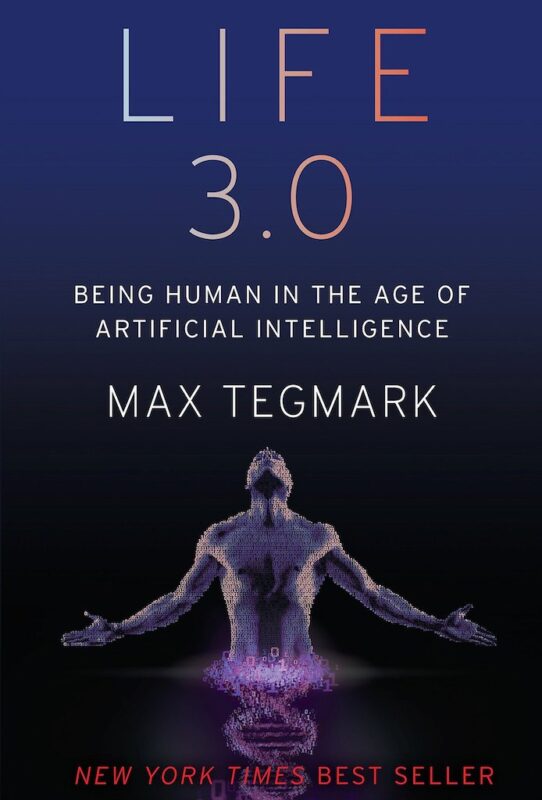
Have you ever wondered how a typical human experience in an AI-driven world would be? Well, you’ve got to read this New York Times Best Seller by Max Tegmark for a clearer picture.
Life 3.0: Being Human in the Age of Artificial Intelligence discusses the impact of AI in virtually all facets of our life, from jobs and crime to justice, war, society, and the very essence of our being. The author is a Massachusetts Institute of Technology (MIT) professor who’s dedicated a significant part of his profession to mainstream AI-based research.
This book attempts to answer some of the most intriguing AI-related questions.
For instance, you’ll learn how artificial intelligence can impact the corporate sector without rendering human knowledge redundant. You’ll also learn how we can improve future AI technologies to serve human needs better, how to prevent machines from outsmarting us, and the ever-raging ethical debate surrounding AI.
10. Python: Beginner’s Guide to Artificial Intelligence
by Denis Rothman, Matthew Lamons, Rahul Kumar & 3 Others
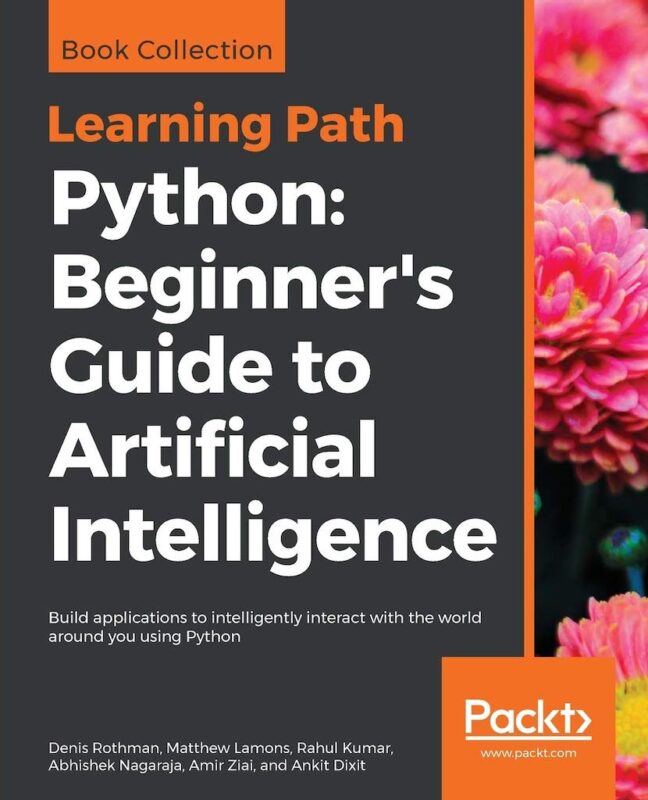
When several authors contribute their knowledge to one book, you know that the outcome is bound to be intriguing. Well, that’s pretty much what you get with “Python: Beginner’s Guide to Artificial Intelligence,” a book by six different writers.
Most artificial intelligence publications will quickly bore you with their long-winding theoretical outlooks of the topic. However, this book is a welcome exception.
The book offers real-world contextualization of AI concepts in solving everyday problems. Some of the topics discussed include machine learning, deep learning, and data analysis.
The goal of “Python: Beginner’s Guide to Artificial Intelligence” is not only to furnish you with useful knowledge on AI. By the time you’re done reading the book, you should be able to design and implement AI in real life using various open-source Python libraries like TensorFlow.
11. Artificial Intelligence: Learning Automation Skills with Python
by Chris Baker
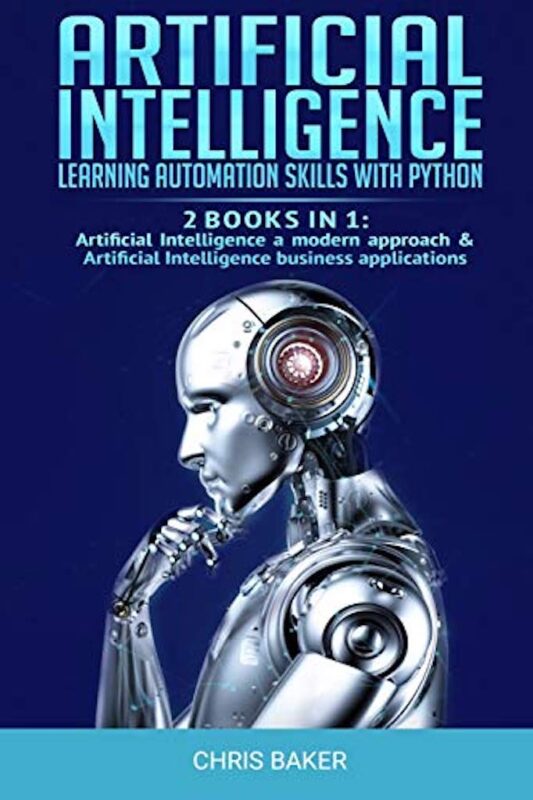
Chris Baker’s “Artificial Intelligence: Learning Automation Skills with Python” is an excellent read for anyone grappling with the nagging fears that AI poses an existential threat to human existence.
The book begins by providing an introductory review of artificial intelligence and its evolution over the last sixty years or so. It then digs deeper into the technology’s effects on human behavior and development.
You’ll also learn about the advancements in machine learning and how this technology uses artificial neural networks. Other key topics covered include how to build an AI-ready culture, how you can leverage AI to transform your business, and the impact of this technology on our day-to-day lives.
“Artificial Intelligence: Learning Automation Skills with Python” is both informative and thought-provoking. Every individual section attempts to analyze the big question of AI within the context of human survival.
12. A First Course in Artificial Intelligence
by Deepak Khemani
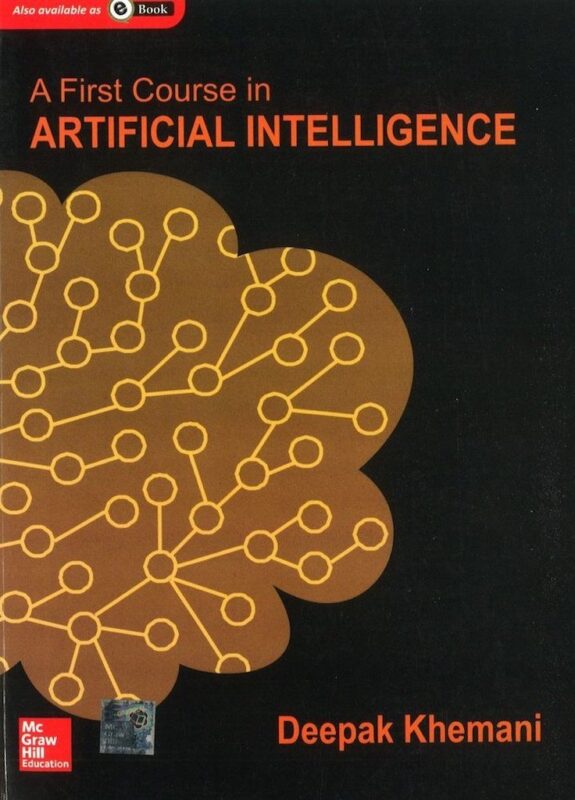
One of the most effective ways to grasp artificial intelligence is to study it using a bottom-up, inside-out approach. And that’s exactly what this book promises.
A First Course in Artificial Intelligence looks at the fundamental AI strategies required to implement a problem-solving agent. The book mainly serves as an introductory course on AI. It uses a knowledge-based approach to exploring the various techniques you can implement while using AI agents.
The author offers a step-by-step guide, starting with the first principles using search and then leading up to the representation and use of knowledge. Each sentence is carefully packaged and skillfully rendered. Besides, there are several examples which mainly touch on the reasoning part of AI.
The book’s layout ensures that readers of different AI knowledge levels can benefit from the content.
13. Fundamentals of Machine Learning for Predictive Data Analytics: Algorithms, Worked Examples, and Case Studies
by John D. Kelleher, Brian Mac Namee, and Aoife D’Arcy
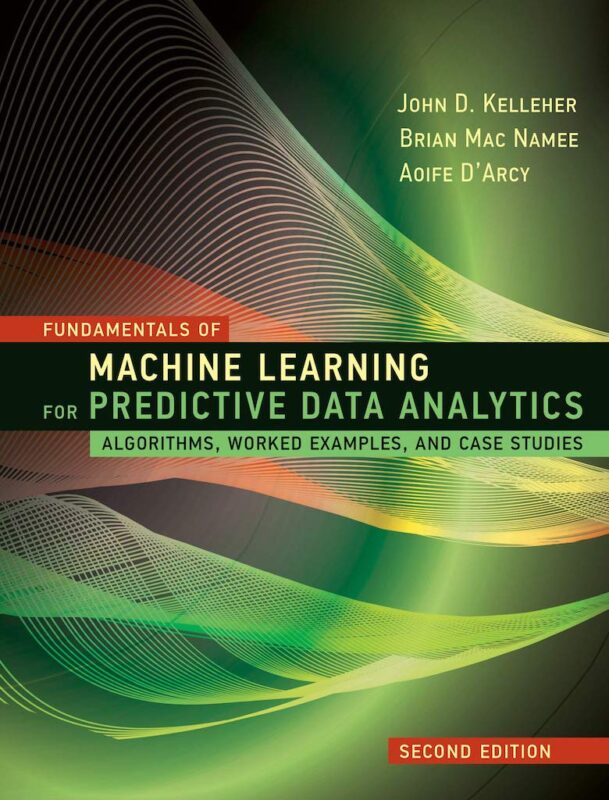
Fundamentals of Machine Learning for Predictive Data Analytics covers the full gamut of machine learning basics.
The book discusses both theoretical concepts and practical applications of machine learning within the context of human empowerment. It also highlights a few case studies and use cases to help the reader appreciate how tremendously the technology is transforming our lives. Of special focus is how machine learning can help with predictive analytics.
There are plenty of technical and mathematical illustrations in “Fundamentals of Machine Learning for Predictive Data Analytics.” But as already mentioned, these are augmented using elaborate examples and case studies for easy understanding.
And while this AI book discusses several concepts of artificial intelligence, the topics are sorted into four different approaches and rendered in simple, beginner-friendly language. They include information-based learning, probability-based learning, similarity-based learning, and error-based learning.
14. Machine Learning: The New AI
by Ethem Alpaydin
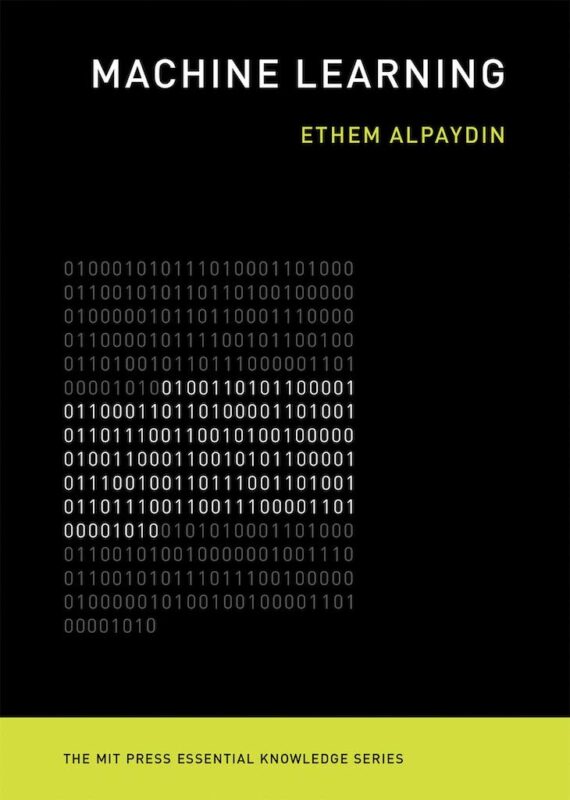
Machine Learning: The New AI by Ethem Alpaydin provides an analytical overview of machine learning. The book describes the origin and evolution of machine learning. It then highlights the importance of learning algorithms and offers real-life examples of how we can apply such algorithms in our daily endeavors.
Some of the discussed applications include using machine learning algorithms for pattern recognition and developing artificial neural networks inspired by human intelligence.
Want to track the developmental trajectory of machine learning from simple number-crunching equipment to modern, sophisticated gadgets like mobile phones? Well, this is the book to add to your reading list.
Besides dwelling on the past and present of machine learning, Ethem Alpaydin’s “Machine Learning: The New AI” also provides a sneak preview into the future of this unstoppable technology. It especially touches on the ethical and legal implications of machine learning in relation to data privacy and security.
15. The Hundred-Page Machine Learning Book
by Andriy Burkov
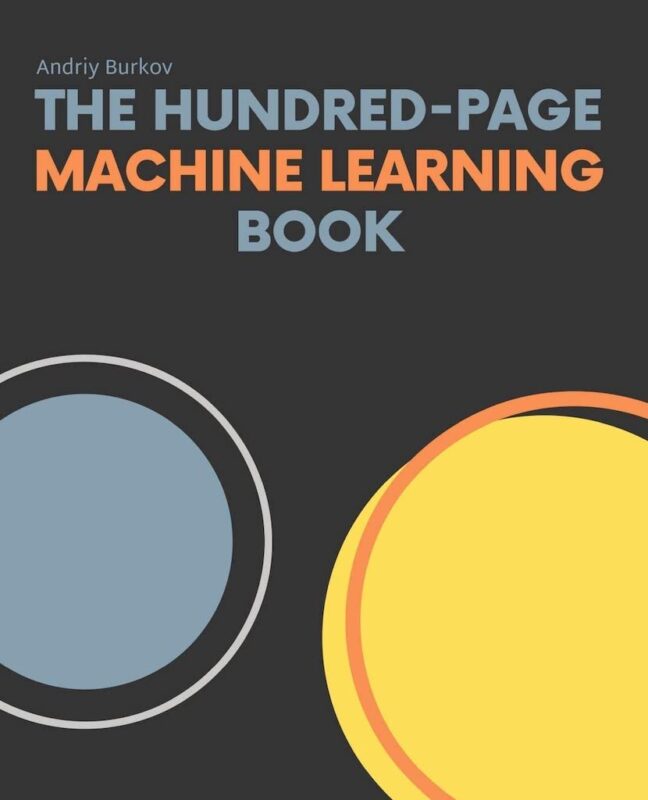
The Hundred-Page Machine Learning Book by Andriy Burkov has been described by many industry experts as the most educative AI publication ever released. The book provides an in-depth introduction to machine learning for beginners.
First, this book explains the nitty-gritty of machine learning in a style that newbies can understand best. It then introduces you progressively to other more intricate aspects of machine learning as you read through the chapters. The author even shares real-life applications of this technology, most of which are based on his own experience.
Obviously, these use cases will make more sense when you have some introductory knowledge of machine learning. So, be sure to read the book chapter to chapter as opposed to skimming through it.
Andriy Burkov’s The Hundred-Page Machine Learning Book also covers various approaches to machine learning. These include classical linear, logistic regression, modern support vector machines, random forests, and deep learning, to mention but a few.
16. AI 2041: 10 Visions for Our Future
by Chen Qiufan and Kai-Fu Lee
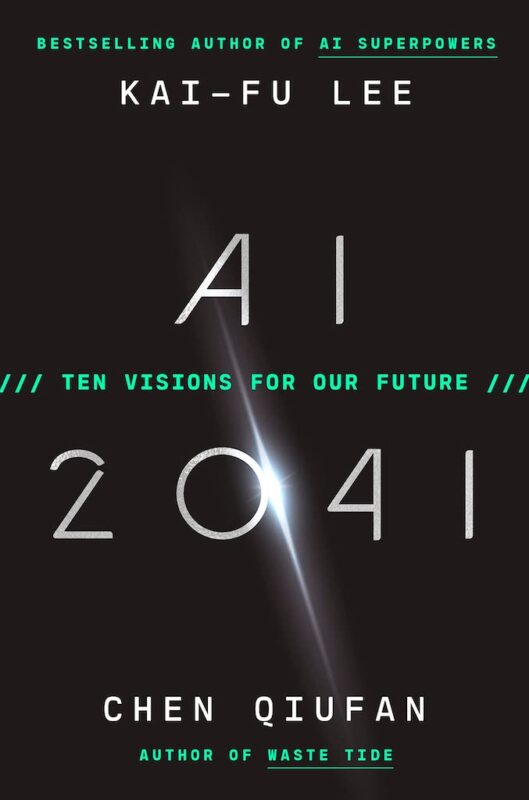
Artificial intelligence is quite sophisticated. So complex is the topic that one of the best ways to deliver AI-related information is to use a story-centric approach.
If you’re looking for a book about artificial intelligence that breaks down all the industry jargon into simplified explanations, then you want to look in the direction of “AI 2041: 10 Visions for Our Future by Chen Qiufan and Kai-Fu Lee.”
AI 2041: 10 Visions for Our Future envisions how artificial intelligence might impact our world in about two decades. According to the authors, human existence will change forever as we continue to embrace the innovative AI technology.
The book’s in-depth review of AI and its engaging delivery makes it a perfect read for complete tech dummies out there. No wonder it has won numerous accolades, including getting named one of the best books of the year by the Washington Post, Wall Street Journal, and Financial Times.
17. Machine Learning For Absolute Beginners
by O Theobald
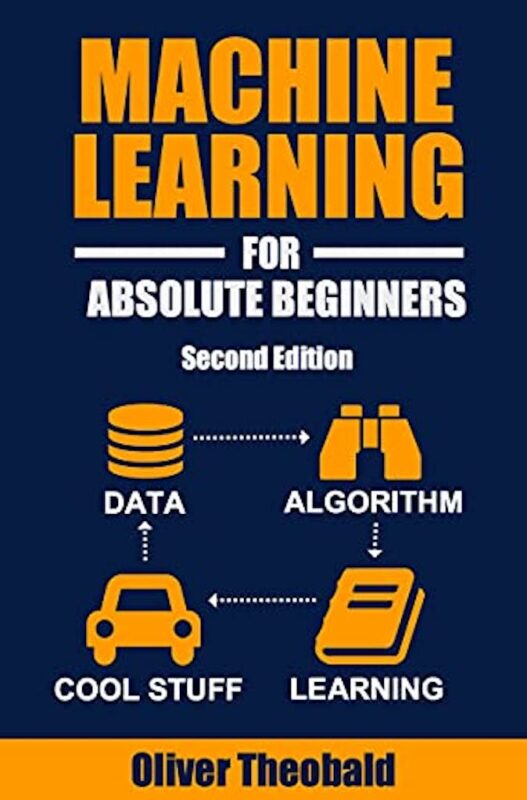
The last AI book on our list has also received the recognition of numerous critics. And the name pretty much sums up what the content is all about.
Machine Learning For Absolute Beginners takes you through a basic introduction to machine learning and artificial intelligence. You’ll learn what machine learning is, where the journey began, and the strides made so far. The author will then take you through the fundamental machine learning techniques and algorithms, as well as what the future holds for this technology.
All the explanations are bold, incisive, and carefully rendered in a language that’s understandable to readers with ZERO AI knowledge.
Although O Theobald takes the credit for authoring “Machine Learning For Absolute Beginners,” he drew much of his inspiration from personal experiences as well as that of professionals from various walks of life. Most of the insights are from seasoned technologists, inventors, data analysts, and inventors.
Summary
Artificial intelligence is gradually permeating our everyday life and impacting it in ways we never imagined. However, AI can be such a complex topic for non-techies.
Fortunately, you can launch your career in artificial intelligence or simply increase your knowledge base by reading the above-listed AI books.

